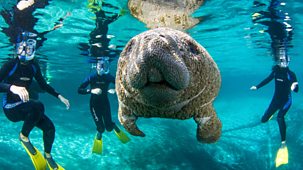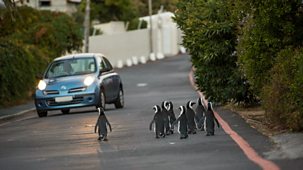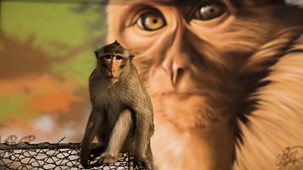
Series 1: 3. Outcasts
In the last 30 years the world's urban areas have almost tripled in size, changing at a rate wildlife has never experienced before. As cities are built, animals are pushed out of their natural homes. Their stories are the most surprising and captivating of all. Today, these 'wild outcasts' find themselves fighting for their place in a land that once belonged to them.\n\nIn this episode we feature elephants in Sri Lanka and see that competition between them and humans for land and resources is resulting in deadly territorial conflicts, which demand solutions. And on the Pacific coast of Costa Rica we meet a troop of capuchin monkeys and learn how our behaviour is affecting them, and raising big questions about their future.\n\nBut we also discover where we learn to live with wildlife as neighbours, and give it the space and resources it needs, it can thrive. The resulting relationships between human and animals can be mutually beneficial. We meet an Amsterdam heron called Kiri who has been visiting the same house twice a day for the last 17 years, befriending its owner, and the Florida manatees whose population has recovered to such an extent under the guardianship of local human residents that, in recent years, they have been taken off the endangered species list, and contributed to a massive boom in the local tourism industry. We meet the swiftlets who have evolved to live only in people's houses and specially built swiftlet hotels in Indonesia. And the surprising story of a population of tiny foxes on a Californian island whose presence benefits the hardened military personnel of a US naval base.\n\nThis hopeful but realistic episode culminates with the return of charismatic ocean giants to the world's most iconic city, as humpback whales breach against the New York skyline.
Source: BBC 2
Most recent episodes of Cities: Nature's New wild
Cities: Nature's New Wild
Series 1: 3. Outcasts
In the last 30 years the world's urban areas have almost tripled in size, changing at a rate wildlife has never experienced before. As cities are built, animals are pushed out o ...
16-02-2025
BBC 2
Cities: Nature's New Wild
Series 1: 2. Commuters
More than a billion people around the world commute into cities each day, and they are not alone. The world's wildlife is commuting too. A steady flow of animals journey in and ...
26-01-2025
BBC 2
Cities: Nature's New Wild
Series 1: 1. Residents
The world's cities are growing at a faster rate than any other habitat on the planet. And while most of us imagine them to be concrete jungles devoid of nature, for animals of a ...
05-01-2025
BBC 2
Most popular episodes of Cities: Nature's New wild
Cities: Nature's New Wild
Series 1: 1. Residents
The world's cities are growing at a faster rate than any other habitat on the planet. And while most of us imagine them to be concrete jungles devoid of nature, for animals of a ...
05-01-2025
BBC 2
Cities: Nature's New Wild
Series 1: 3. Outcasts
In the last 30 years the world's urban areas have almost tripled in size, changing at a rate wildlife has never experienced before. As cities are built, animals are pushed out o ...
16-02-2025
BBC 2
Cities: Nature's New Wild
Series 1: 2. Commuters
More than a billion people around the world commute into cities each day, and they are not alone. The world's wildlife is commuting too. A steady flow of animals journey in and ...
26-01-2025
BBC 2



